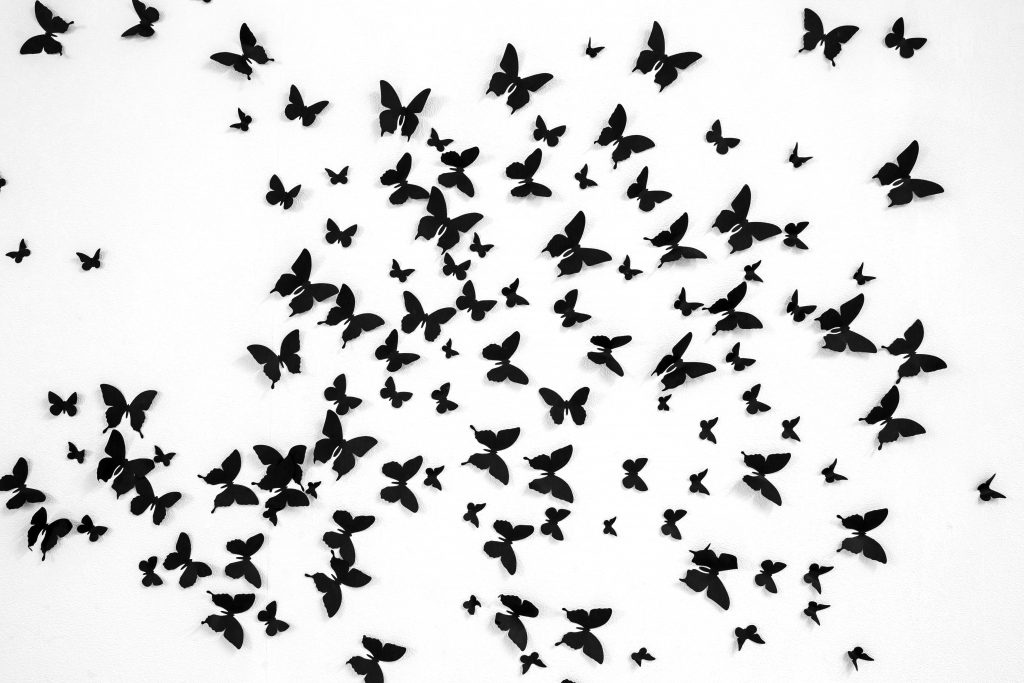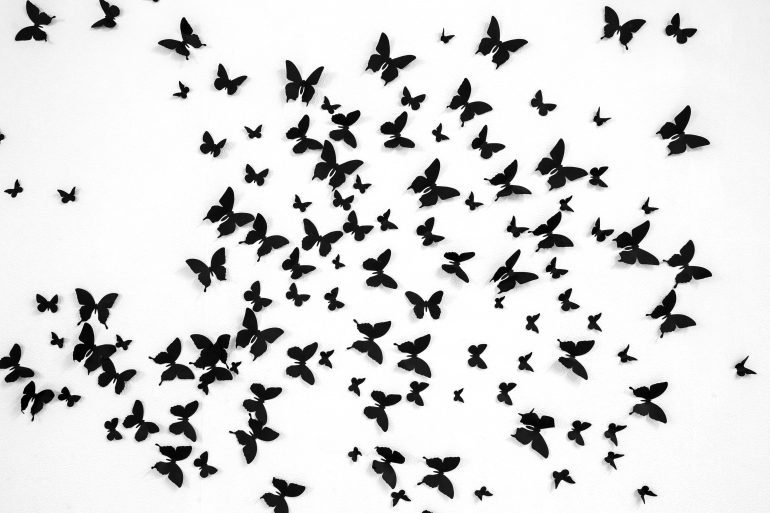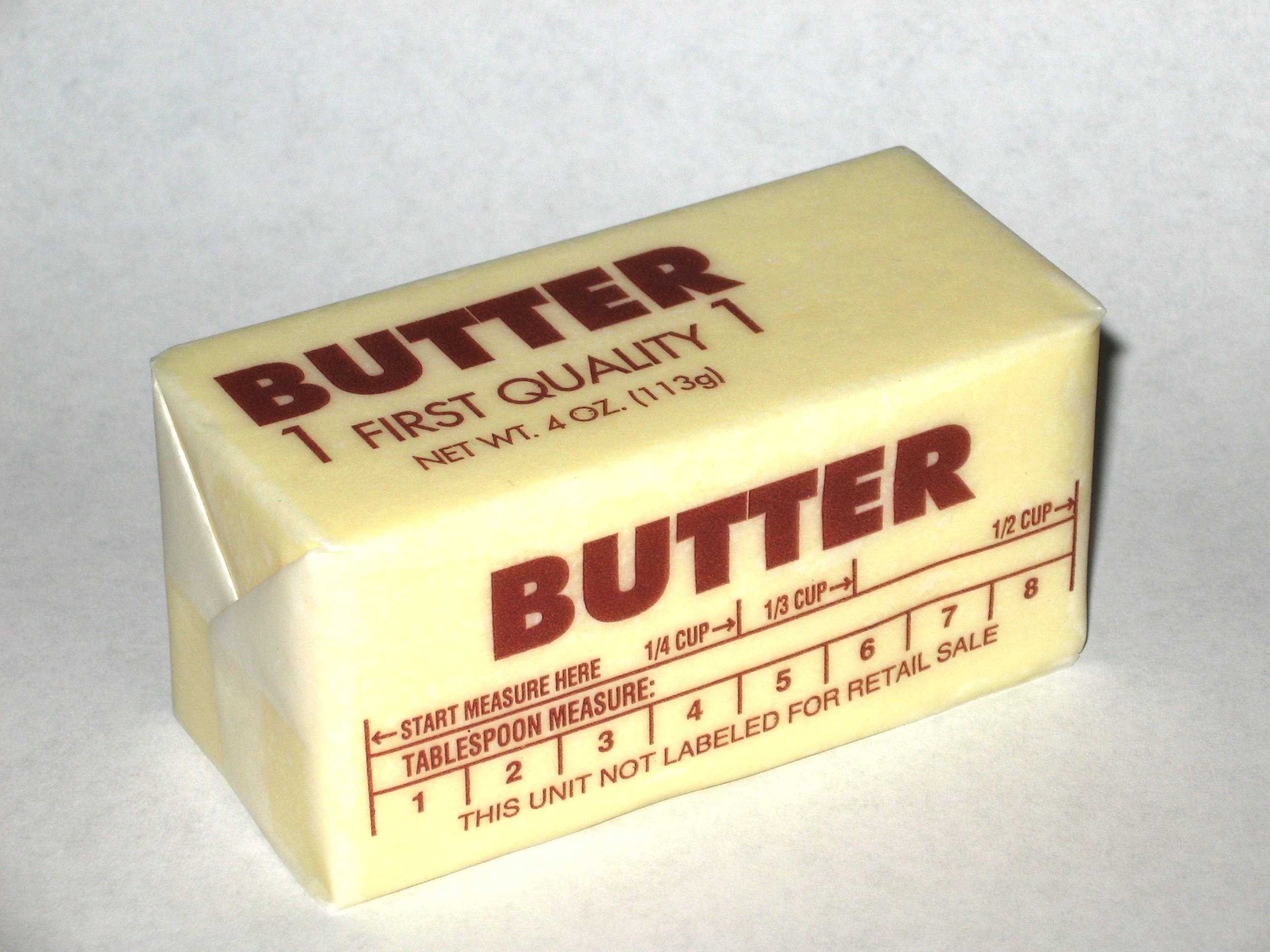Meg Pokrass and Aimee Parkison

When I was eleven, I visited Grandma every few weeks. She had stopped talking to other people. There was a photo of her as a younger woman, wearing a dress and standing next to an old skinny cow. It was prominently displayed on her mantlepiece. She had a few photos of Grandpa in her old house, but not on display. I used to beg her to pull them out of a box, but eventually I stopped asking.
In the picture of her and the cow, Grandma wore a checkered dress with her hand on the cow’s back. The cow looked like it had seen better days. There was a peacefulness between them that drew me.
Both of my grandmother’s breasts were missing. I loved how she appeared to me. So flat, and perfect and calm.
“Tell me about that cow,” I said.
“Her name was Clara Bow, Nuthatch. And she wasn’t really a cow. Not to me.” Nuthatch was what my Grandma called me, until I became a teenager.
“Nuthatch” is how I like to remember myself, even now.
“One year, we had a crisis,” she said.
She wrapped her arms around her body like a harness. “Your mother was angry at me. Just a little older than you are. She threw her shoes at the wall for a whole year. And then, she ran away.”
Inside the flatness of her chest I imagined Grandma’s heart bonging like a cowbell. It felt as if my ear was pressed up hard against her life, listening for something. My mother died of breast cancer when I was small.
“Seriously? She did that?”
“Well, I talked with Clara Bow,” she said. “She never judged your mother, or me.” There were so many things about my mother I’d never know, but even if I did, it wouldn’t bring her back. I imagined that a cow could feel honored and lucky. To have won Grandma’s trust. The way I had. Because she hardly spoke to anyone else. I was the only one. I was her Clara Bow.
I stood near Grandma, nuzzling her as she spoke, petting my head. I gazed up at her with loving eyes, devoid of judgement, imagining myself a lucky, honored cow.
“You can tell me anything, Grandma,” I said. “Anything at all.”
“No. I can’t.”
“You can tell me your secrets, all your greatest secrets, things you’ve never told anyone. Things my mother knew and you knew that you thought I should never know. I’m your Clara. Your Clara Bow. I won’t judge you. Or her.”
“I don’t know.”
“Try me,” I said, thinking that becoming Clara Bow was the way to edge into Grandma’s heart, to get closer to my mother. I was just realizing that a shortcut for learning about the world was to make myself into a placid pet, a Clara Bow, so Grandma would tell me anything and everything, things she would normally never tell anyone, especially not a child.
“Okay. Do you know about the butterflies?” Grandma asked.
“What butterflies?” I asked.
“These butterflies,” Grandma said. She slapped the long velvet ebony curtains over the windows until the ebony on the curtains flew away to the ceiling, turning the curtains from ebony velvet to light moss-green silk before making a black hole in the ceiling. A hole made of butterflies.
“These black butterflies. I never could get rid of them.”
“What do you mean?”
“Before I got sick, the black butterflies were swarming in the house,” Grandma whispered. “I tried to protect your mother from them. But she saw them landing on my chest when I went to sleep in the night. There were so many, and I couldn’t capture them all. They were fluttering to me as if my breasts were full of nectar. The butterflies, all those black butterflies landing on my breasts, as if my breasts were flowers.”
“Why?”
“I don’t know. When I had my breasts removed, the butterflies started to stray from me and went to your mother, landing on her breasts, especially when she slept in the night. But she was young and didn’t want to have her breasts removed like mine. She blamed me for the butterflies landing on her and started to grow sick because of them. When she realized she couldn’t kill them, she tried to out run them.”
“And now she’s gone and you’re here. I keep watching over you while you sleep. I keep shooing the black butterflies away from your chest in the night.”
“You do?”
“They keep landing on your breasts, as if your breasts are flowers.”
It took a long time for me to understand we were a family of women doomed by black butterflies. That’s why my mother threw her shoes at the walls for a year before she ran away. She was trying to kill the black butterflies that lived inside Grandma’s house and landed on women’s breasts at night when the women were sleeping. Black butterflies flew all around us, and Grandma was always capturing them, to keep them away from me.
When she saw one, she tried to distract me by talking about Clara Bow.
“Clara Bow wasn’t afraid of black butterflies,” Grandma said. “That’s why I could tell her everything. She was the only one here who wasn’t afraid of them.”
Grandma opened the box of Grandpa photographs, and out flew black butterflies, their wings shimmering midnight.
Grandma opened her mouth to say my name, and a black butterfly flew out of her mouth and into mine. I swallowed it and ran toward the spotted cow in the field, where the black butterflies were swarming around my breasts as if my breasts were lilies. I raced to the white cow with black spots. It was a great-grand daughter of Clara Bow, a pet so pretty I only wanted to stroke its fur. When I reached out to touch its white hide, I found the black spots were butterflies flying away.
Aimee Parkison is the author of five books of fiction, including Refrigerated Music for a Gleaming Woman, which won the FC2 Catherine Doctorow Innovative Fiction Prize. Parkison has been published in numerous literary journals. She is full Professor of English in the Creative Writing Program at Oklahoma State University. Find out more at www.aimeeparkison.com and follow her on Twitter at @aimeeparkison.
Meg Pokrass is the author of five flash fiction collections and a book of prose poetry, Cellulose Pajamas, for which she received the Blue Light Book Award. Her work has been widely internationally anthologized, most recently in New Micro(W.W. Norton & Co., 2018), Flash Fiction International (W.W. Norton & Co., 2015) and The Best Small Fictions 2018, 2019. She serves as Founding Co-Editor of Best Microfiction 2020 and teaches flash fiction online and in person. Find out more at megpokrass.com and follow her on Twitter at @megpokrass.


